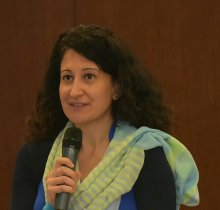More companies than ever considering virtual options, says Broadridge
Many issuers are putting a contingency plan into their proxy materials to allow them to host a virtual shareholder meeting if in-person events can’t go ahead, according to Broadridge.
In-person shareholder meetings have long been favored by listed firms and investors in the US but the spread of Covid-19 could lead to a surge in the number of virtual shareholder meetings this year, according to Broadridge vice president of issuer strategy Cathy Conlon.
‘The norm is that public companies [in the US] hold physical AGM meetings,’ she says. ‘What we are seeing in the upcoming annual shareholder meetings season is that many more companies and their legal advisers are inquiring about what they can do if they need to make a switch to virtual meetings. Many more companies than before are considering having an option to go virtual.’
In 2019 Broadridge hosted 326 virtual shareholder meetings for companies, from a total of about 5,000 issuers incorporated in the US. While still a fraction of the overall pool of listed companies, this number represents a 15 percent rise compared to 2018’s figures.
Conlon predicts a significant surge of virtual shareholder meetings this year: ‘I think the volume of clients going virtual will be significantly higher this year than in 2019.’
Starbucks was the first high-profile company to cancel its in-person proxy meeting, scheduled for March 18. The company filed documents with the SEC on March 4, notifying the regulator that it intended to proceed with a virtual-only meeting.
Investors’ concern continues
Even in light of the recent Covid-19 pandemic, shareholders’ concern continues over virtual-only meetings jeopardizing their ability to ask questions of company management and potentially leaving CEOs and boards unaccountable to investors.
Glass Lewis published a blog post on March 6 saying investors had raised concerns that the virtual-only structure might reduce access to the board and management, consideration of shareholder proposals, and the overall rights of shareholders.
In response to these concerns, Conlon says: ‘The virtual meeting gives a lot more access to board and management for shareholders than a physical meeting would’, adding that shareholders can fully participate, ask their questions of management, get the answers they need and cast their votes.
Legal constraints
Shareholder meetings are governed by each state’s Business Corporation Act, which creates legislative hurdles in some states when it comes to holding a virtual-only meeting.
Under current state corporation law, virtual-only meetings are allowed in 30 US states including Delaware, which means more than half of all US companies are able to hold a virtual-only meeting. Thirteen states allow hybrid meetings, requiring a physical component to a virtual meeting. Seven US states – including Wisconsin, South Carolina, New York and Alaska – still require a physical shareholder meeting.
Despite the spread of the virus in the US coupled with a growing concern about attending public gatherings, Conlon has not heard any suggestion that there could be an amendment to the Business Corporation Act of these states.
In a separate development, the SEC has issued regulatory relief for issuers affected by Covid-19, allowing them a 45-day delay for disclosures – including quarterly reports – that were scheduled for release between March 1 and April 30. ‘Companies must convey… a summary of why the relief is needed in their particular circumstances,’ notes the regulatory statement.
No regulatory relief or changes to the upcoming US AGM protocol in response to the Covid-19 pandemic have been issued by the SEC so far.
‘The SEC… will continue to closely track developments, and, if appropriate, consider additional relief from other regulatory requirements for those affected by the coronavirus,’ concludes the statement.
The SEC did not return a request for further comment.










